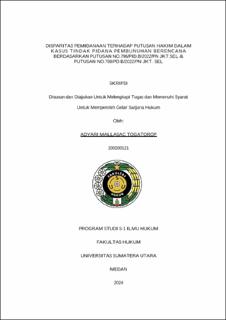| dc.description.abstract | Disparity in sentencing is one of the legal phenomena where individuals proven to have committed similar offenses and facing similar punishments may receive different verdicts. Disparity in sentencing can occur, of course, accompanied by various considerations by the judge. The factors considered by the judge are certainly under scrutiny; if someone is proven guilty, their punishment should be the same as that of others who commit similar crimes. If this is not well articulated, it will inevitably lead to jealousy among other offenders. The formulation of the problem in this writing is: How is the Legal Regulation in Indonesia Regarding Disparity in Sentencing in Judicial Decisions? How is the Legal Perspective in Indonesia on Premeditated Murder? How is the Implementation of the Principle of Judicial Independence in the South Jakarta District Court Decision No. 796/Pid. B/2022/Jkt. Sel and the South Jakarta District Court Decision No. 798/Pid. B/2022/Jkt. Sel? The type of research used in this study is normative or doctrinal legal research, which is conducted based on library materials, examining theoretical aspects related to legal principles, legal concepts, legal views and doctrines, regulations, and legal systems by using norms in laws and other regulations, studying books, laws, and other documents closely related to the research. Indonesia, as a rule of law state, certainly guarantees the principle of an independent judiciary, meaning that the judiciary is free from any other powers (Article 24 paragraph (1) of the 1945 Constitution of the Republic of Indonesia). Judges are one of the actors in the judicial power (Article 19 of Law number 48 of 2009 on judicial power). The law grants judges, as state judicial officials, the authority to adjudicate (Article 1 point 8 of the Criminal Procedure Code). The judicial power law states that in examining, adjudicating, and rendering decisions, a judge has significant power and freedom.The fulfillment of the elements of the premeditated murder offense in accordance with Article 340 of the Criminal Code, as carried out by the judges in Decision No. 796/Pid.B/2022/PN Jkt. Sel & Decision No. 798/Pid.B/2022/PN Jkt. Sel, has been done well. After analyzing the existing legal facts, the author believes that the fulfillment of the elements has been carried out correctly. The implementation of the principle of judicial independence in the Verdict, based on analysis results supported by expert opinions stating that public pressure influenced the judges in deciding this case, has provided sufficient evidence that the principle of judicial independence was not well upheld, leading to disparities in the judges' verdicts. | en_US |


